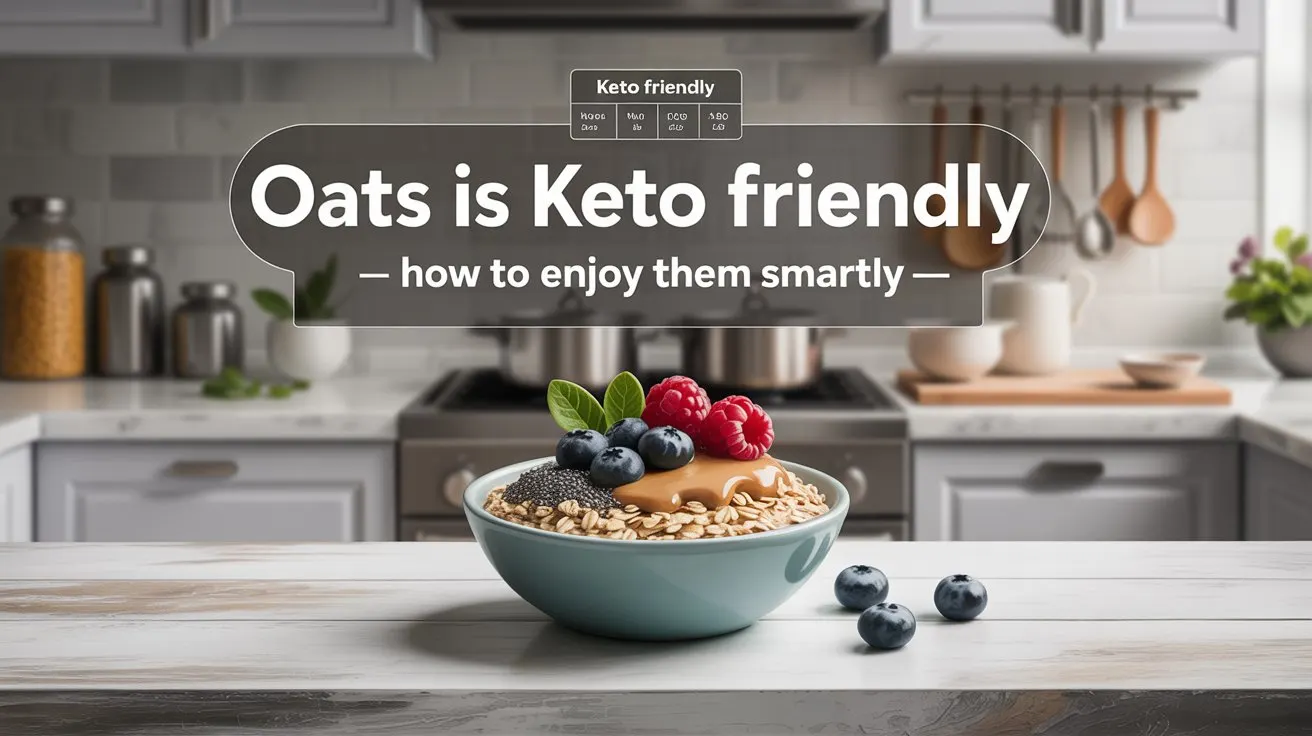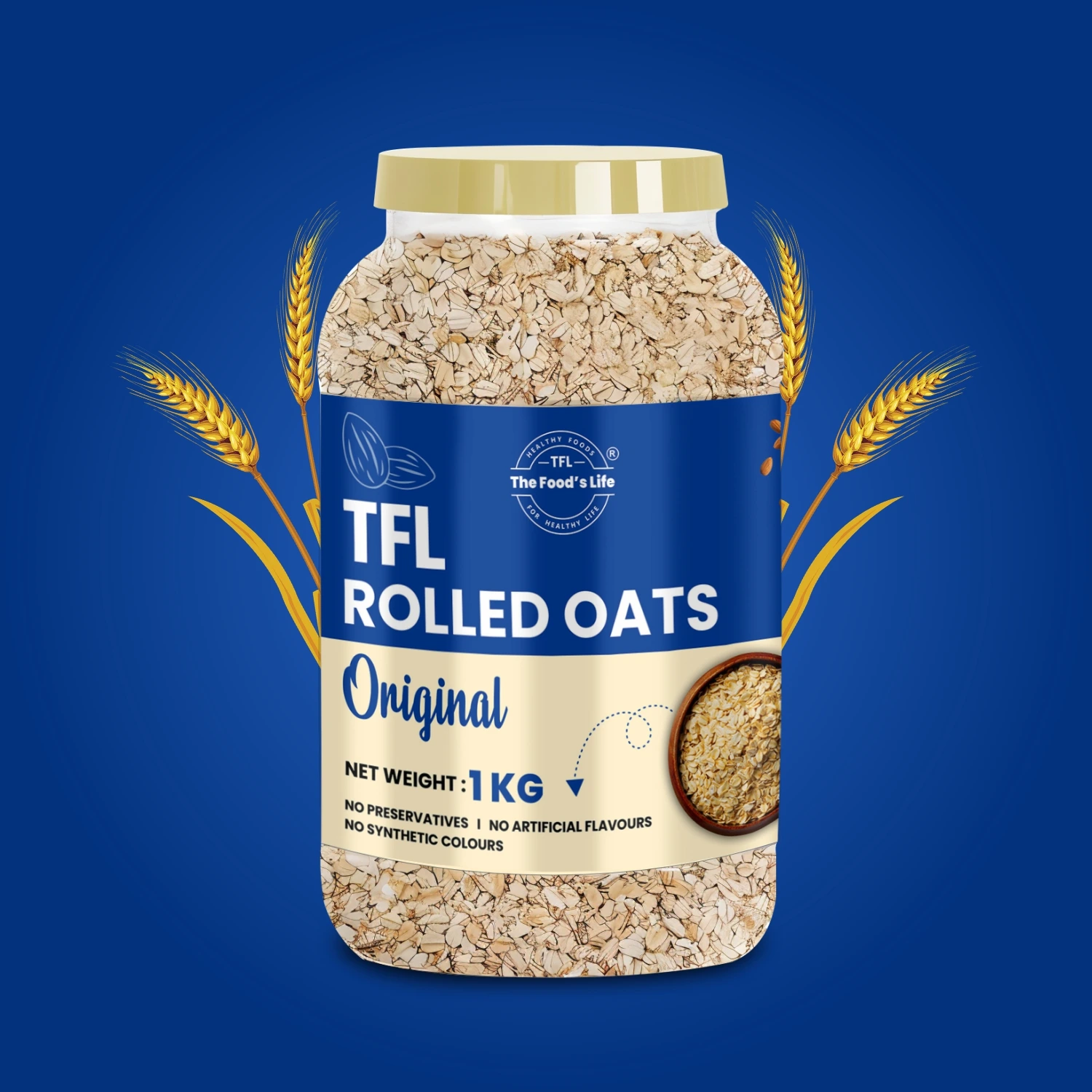Oats are a nutrient-dense grain known for their fiber, protein, and heart-supportive properties. While traditional lore tells us that oats are a classic high-carb food, we now know that oats can be keto friendly if eaten mindfully and in moderation especially as part of a targeted keto or cyclical keto approach.
Oats are high in beta-glucan fiber which supports digestion, manages cholesterol and keeps you feeling fuller longer, which is especially beneficial if you are managing your weight or blood sugar on a low carb regimen.
When it comes to oats for pregnant women, even more great benefits. Oats provide sustained energy, easy digestibility, and important micronutrients like iron and magnesium. In this regard, the oatmeal benefits for pregnant woman are substantial - especially in the early mornings when appetite is altered.
In choosing the best oats for pregnancy, it is most important to select steel-cut or minimally processed whole oats so that you can obtain all of the wonderful fiber and micronutrients. Oats are very easy to prepare in water, milk, or plant-based milk and can be dressed with seeds or nuts which provides you with a wholesome, energy packed breakfast.
Can Oats Be Keto Friendly? Understanding Carb and Fiber Balance
Oats may not have the reputation of being low-carb food, but oats is keto friendly — if eaten in moderation. On a standard keto diet, net carbs are usually limited to around 20–50 grams. Oats do contain carbs, but oats have a higher fiber content which will offset the net carbs and adds a little to the keto arsenal for modified or targeted keto diets.
- Oats contain complex carbohydrates and soluble fiber, the main type of soluble fiber in oats is beta-glucan, which slows digestion and increases fullness.
- If you're doing a cyclical or targeted keto diet, small amounts of oats provides energy and nutrients without knocking you off ketosis.
Net carbs vs total carbs—why fiber matters
It's important to understand that there's a difference between some one trying to determine whether or not eating oats is keto friendly or not.
- Total carbs = all carbs in food.
- Net carbs = total carbs minus fiber and sugar alcohols (if any).
Where this gets important:
- A ½ cup of dry oats has approximately 27 grams of total carbs and 4 grams of fiber = 23 grams of net carbs.
- If you are eating oats post workout or for a carbohydrate refeed, it still works with your keto goals.
Choosing steel‑cut or rolled oats for lower impact
When you're trying to make oatmeal for keto diet meals, it matters which variety of oat you select.
Steel-cut oats:
- Less processed than rolled oats.
- Low glycemic index.
- More fiber per gram.
- While they take longer to cook, they are more satiating.
Rolled oats:
- Tend to be slightly higher in net carbs than steel-cut oats.
- They cook faster than steel-cut oats, but have retained a similar fiber profile.
Don't choose instant oats, they are highly processed and raise blood sugar fastest making it less suitable for a ketogenic or low-carb plan.
Portion control tips to keep you in ketosis
Just because oats are keto friendly in small portions doesn't mean you can eat a whole bowl every morning. The trick is to pay attention to your portion sizes and to pair it with compliant keto ingredients.
Smart portioning tips:
- Stick to ¼–⅓ cup of oats (dry) per person.
- Add fat like chia seeds, nut butter, or coconut cream to balance your meal.
- Combine oats with either flaxseeds or a scoop of protein powder to boost fiber and protein.
Use oats for baking recipes or an easy keto energy bites recipe—not as a staple for breakfast every day.
Oats for Pregnant Women — Nourishment for Two
A woman's need for nutrition escalates during pregnancy, not only for her own body, but also for the baby. Oats for pregnant women are an easy way to eat a wholesome, balanced option that offers the important nutrients you need during this time.
Why oats are a perfect pregnancy food:
- Oats are packed with complex carbohydrates, and the nutrients are released slowly, so you'll get sustained energy throughout the day.
- Oats are also easy to digest, and they can be made into lots of different foods, so they are a frequent food in a lot of prenatal diets.
- If you’re having morning sickness, or even if you’re just looking for comfort food, oatmeal is easy on the stomach but can meet your cravings.
- Oats aren't just a convenient pantry food—they are a superfood when you are pregnant.
Oatmeal benefits for pregnant moms: folate, iron & fiber
Oatmeal is nutrient dense and offers lots of nutrients in pregnancy.
Aside from the abundant nutritional values of oatmeal, here are some of the benefits of oats for pregnant women:
- Folate: Also known as vitamin B9, is essential for brain and spine development of the fetus, folate can help prevent neural tube defects.
- Iron: Much needed to support the additional blood volume during pregnancy, and to reduce the chance of anemia.
- Fiber: Fiber will help ease pregnancy issues, such as constipation and bloating, since it promotes healthy digestion
These nutrients, combined with eating oats for pregnant women can make each sitting of oats one of the best oats for pregnancy, as long as it is combined with a balanced meals.
How oats support healthy weight gain and digestion
Achieving healthy weight gain and digestive harmony are two pivotal pieces of the pregnancy puzzle—and oats facilitate both.
- Oats help to stabilize blood sugar levels because they provide slow-releasing carbohydrates. They will keep hunger at bay between meals.
- Oats are high fiber, so they can help with gentle digestion and improve symptoms of bloating and constipation—two common pregnancy complaints.
- They provide satisfaction and fullness as pregnant women portions out their meals with intention and control while incorporating portions into other meals.
Although oats may be keto friendly in some situations with some pregnant women, pregnancy is more about balanced nutrition than limiting carbohydrates, and oats fit right into that plan.
Easy oatmeal recipes safe for pregnancy
It’s simple to incorporate oats into your daily pregnancy diet, and these recipes offer both nutrition and comfort:
1. Banana & Chia Overnight Oats
- Combine rolled oats, mashed banana, chia seeds, and almond milk.
- Let it sit overnight in the fridge.
- A perfect fiber-rich, make-ahead breakfast.
2. Apple Cinnamon Oatmeal
- Cook oats with chopped apples, a pinch of cinnamon, and a dash of maple syrup.
- This warming bowl offers iron and antioxidants.
3. Savory Oatmeal with Spinach & Egg
- Cook oats in vegetable broth and stir in spinach.
- Top with a soft-boiled egg for added protein and iron.
Each of these recipes showcases the oatmeal benefits for pregnant moms—easy to digest, nutrient-rich, and easy to make.
Choosing the Best Oats for Pregnancy
When it comes to Oats for pregnant women, selecting the right type is just as important as incorporating them into your daily meals. The best oats for pregnancy provide optimal nutrition, easy digestion, and minimal exposure to harmful additives.
Best oats for pregnancy: look for whole‑grain, gluten‑free labels
- Whole-grain oats are the most beneficial because they retain all parts of the grain—the bran, germ, and endosperm—making them high in fiber, vitamins, and minerals.
- Choose oats labeled "gluten-free" to avoid cross-contamination with gluten-containing grains like wheat, rye, or barley. While oats are naturally gluten-free, many are processed in facilities that handle gluten.
- Rolled oats and steel-cut oats are preferable over instant varieties, which may contain added sugars or preservatives.
Whole-grain options support energy levels and digestive health, two important factors for expecting mothers.
Why organic and low‑pesticide oats are ideal
- Organic oats are grown without synthetic pesticides, herbicides, or genetically modified organisms (GMOs), reducing chemical exposure for both mother and baby.
- During pregnancy, it’s recommended to limit pesticide exposure as it can interfere with fetal development.
- Check for certifications like USDA Organic or local organic farming labels to ensure you’re getting clean, responsibly sourced oats.
Choosing organic oats not only ensures purity but also supports environmental sustainability, a growing concern for health-conscious mothers.
Mixing oats with iron-rich foods enhances absorption
- Iron is crucial during pregnancy to support increased blood volume and reduce the risk of anemia.
- While oats do contain some iron, pairing them with other iron-rich or vitamin C-rich ingredients can boost absorption significantly.
Examples include:
- Adding strawberries, kiwi, or citrus fruits to your oatmeal for a vitamin C kick.
- Mixing in pumpkin seeds, raisins, or cooked spinach for added iron.
- Serving oatmeal with a glass of fresh orange juice can also enhance non-heme iron uptake.
This smart pairing maximizes the oatmeal benefits for pregnant women by enhancing its already strong nutritional profile.
Keto-Friendly Strategies When Enjoying Oats
Many believe oats are entirely off-limits on a ketogenic diet, but with the right approach, they can be incorporated mindfully. While oats are not strictly keto due to their carbohydrate content, oats is keto friendly when eaten strategically, especially in modified or targeted keto diets. Here’s how to make oats work for your low-carb lifestyle.
Combining oats with fats and proteins to reduce glycemic impact
- The glycemic index (GI) of a food measures how quickly it raises blood sugar levels. Oats alone may spike glucose, but combining them with healthy fats and protein helps slow digestion and reduce that impact.
- Add chia seeds, flaxseed meal, or a scoop of protein powder to your oats to boost satiety and blunt glucose spikes.
- High-fat toppings like unsweetened coconut flakes, almonds, or a dollop of full-fat Greek yogurt enhance the nutrient profile while maintaining ketosis.
This method not only helps in keeping blood sugar stable but also supports keto-adapted energy levels throughout the day.
Adding avocado oil or nut butter to keto oats
- Avocado oil is rich in monounsaturated fats and has a neutral taste, making it an ideal mix-in for keto oats.
- Nut butters like almond, peanut, or macadamia butter are high in fat, low in carbs, and add rich flavor.
- A tablespoon of these healthy fats with a modest serving of oats can make the dish more satisfying and nutrient-dense.
Pairing oats with healthy fats also mirrors how Oats for pregnant women can be balanced with nutrient-dense additions to support both mother and baby, though the goals between the two diets differ.
Tracking blood sugar response—even with small servings
- Everyone’s carbohydrate tolerance is different, so test your blood sugar response after consuming oats, especially if you're on a strict keto plan.
- Start with 1–2 tablespoons of oats instead of a full serving, then build up gradually based on how your body reacts.
- Use a glucose monitor or keto breath/urine strips to ensure you're staying in ketosis post-meal.
This cautious approach ensures you maintain control over your macros and optimize your intake, much like how best oats for pregnancy are selected with care for optimal nutrient support.
Portion Control and Meal Planning with Oats on Keto
Including oats in a ketogenic diet can be challenging due to their carb content, but with proper planning, they can still have a place. While oats is keto friendly only in moderation, they offer unique benefits when paired strategically and portioned carefully.
Ideal serving sizes to stay within carb limits
- A standard keto diet restricts carbs to about 20–50g of net carbs per day. A full serving of oats (1/2 cup dry) contains around 23–27g of net carbs, which can easily consume your entire day’s limit.
- To stay keto-compliant, aim for a 1–2 tablespoon serving of oats mixed with high-fat, low-carb ingredients like chia seeds or coconut flour. This micro-portion satisfies a craving without pushing you out of ketosis.
- Consider oat fiber (zero net carbs) as an alternative for adding texture and taste without carbs.
This type of micro-planning is also important when choosing the best oats for pregnancy, though for different dietary goals — focusing on nutrient density rather than carb restriction.
When to eat oats—not right before sleep or high-intensity workouts
- Timing matters on keto. Avoid consuming oats late at night, as even small amounts of carbohydrates can interfere with overnight fat-burning and ketosis.
- Similarly, high-intensity training requires glycogen, which oats can replenish, but their insulin response might not be ideal pre-workout for someone strictly keto.
- The best time to eat oats on keto? Morning or midday when your body can burn off the slight carb intake and use the energy effectively.
For pregnant women, oatmeal benefits for pregnant moms include providing steady energy and supporting digestion — timing can help maximize these effects, especially when paired with balanced meals.
Pairing oats with low-carb sides (eggs, spinach smoothies)
- To make a balanced keto-friendly meal, pair your oats with high-fat, low-carb sides:
- Scrambled or poached eggs with avocado
- A green smoothie with spinach, unsweetened almond milk, and chia seeds
- Grilled tofu or cottage cheese (if allowed)
These pairings add nutritional variety and ensure that oats don’t dominate your carb intake. This style of eating suits both keto followers and those selecting Oats for pregnant women, especially when combined with nutrient-rich sides.
FAQs – Oats Is Keto Friendly & Safe During Pregnancy
Q1 Can I have oats on keto and stay in ketosis?
Yes, oats is keto friendly in small portions. Stick to 1–2 tablespoons and pair with fats and fiber to control net carbs.
Q2 Are oats good for pregnant women?
Absolutely. Oats for pregnant women offer folate, iron, and fiber—key nutrients for mother and baby.
Q3 What’s the best oats for pregnancy?
The best oats for pregnancy are whole-grain, organic rolled or steel-cut oats for maximum nutrition and minimal processing.
Q4 Do oats impact blood sugar on keto?
Yes, but fiber helps. Choose steel-cut oats and limit serving size to reduce spikes while staying keto-compliant.
Q5 Can oatmeal benefits for pregnant moms include digestion support?
Definitely. Oatmeal benefits for pregnant include easing constipation, supporting gut health, and promoting fullness.
Q6 How often can I eat oats while pregnant and keto?
A few times per week is safe. Balance servings to support both keto macros and Oats for pregnant women nutritional needs.
Conclusion — Oats Is Keto Friendly With the Right Strategy
Oats can be part of your low-carb and pregnancy diet with mindful planning. While oats are not traditionally considered ketogenic, they can still be included in moderation. Their nutritional value is undeniable, especially for expecting mothers.
Moderation is key to maintaining ketosis while enjoying oats
- Oats is keto friendly when portioned correctly and combined with healthy fats and proteins.
- Stick to small servings (1–2 tbsp) of steel-cut or rolled oats.
- Always track net carbs and monitor how your body responds to maintain ketosis.
By managing portions and pairing oats with fats like nut butter or seeds, you can stay within your carb limits while enjoying their benefits.
ats for pregnant women deliver important nutrients safely
- Oats for pregnant women are a gentle, nutrient-rich food that supports fetal development.
- They provide iron, folate, magnesium, and fiber—vital nutrients during pregnancy.
- Oats are also easy to digest and can ease common pregnancy issues like constipation.
Adding oats to the diet offers a safe, whole-food option that supports both energy and digestive comfort for mothers-to-be.
Make oats a flexible, nourishing part of your keto‑pregnancy diet
- Choose the best oats for pregnancy—opt for whole grain, organic, and low-pesticide options.
- Use oats in keto-friendly ways like adding them to smoothies or baking with oat fiber.
- Remember the many oatmeal benefits for pregnant women: gut health, satiety, and steady energy.






